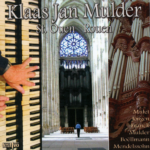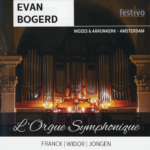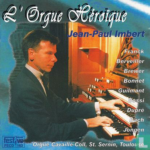Joseph Jongen
Joseph Jongen (1873-1953) was considered to be ‘one of our greatest composers from the first half of the twentieth century’ in 2003, when the 50th anniversary of his death was commemorated by concerts, lectures and an exhibition in the Royal Library of Belgium. He was a prolific composer and his opus 1 dated 1892 was preceded by some tens of other works. He himself limited his catalogue down to 137 opus numbers in various genres, including chamber music, vocal music, orchestral works, solo concerts, as well as compositions for organ, for Jongen also happened to be an organist.
Joseph Jongen was born in Liège on 14 December 1873. At an early age he demonstrated his great musical talent and at the age of seven he was admitted to the Liège Conservatoire. During his studies he obtained prizes for composition, piano and organ. Upon winning the Prix de Rome in 1897 for the cantata ‘Comala’ he made a four-year educational tour through Italy, Germany and France. In 1902 he was appointed as professor of harmony and counterpoint at the Liège Conservatoire. When the First World War erupted, he and his family fled to England. There he performed as a pianist and organist and gave many concerts with the Belgian Quartet, a piano quartet he had founded with other exiled Belgian musicians. After the war, he returned to his place of birth. In 1920 he was appointed as professor at the Royal Conservatoire in Brussels. Five years later, he became the director of this institute, a position which brought him much esteem. After retiring in 1939, Jongen withdrew to his country house in Sart-lez-Spa in the Ardennes, where he was able to work on his compositions in peaceful seclusion. He wrote his last work in 1951. Tired and sick, he died in Sart on 12 July 1953.
Jongen was not someone who placed himself in the limelight. Instead of promoting his own compositions, he devoted himself to drawing the public’s attention to the work of his contemporary colleagues, particularly as the conductor and leader of the Concerts Spirituels (including much religious music) from 1919 to 1925 in Brussels. The organ plays a brilliant role in one of Jongen’s greatly admired compositions: the Symphonie Concertante for organ and orchestra opus 81. He also wrote a Hymn and an Alleluia for organ and orchestra.
Although Jongen was open to influences of his time, his ambition was not to create compositions which were examples of innovation. He remained true to late Romanticism and Impressionism. In particular his organ works owe much to the school of César Franck, who was also born in Liège but had become a true Frenchman. The Sonata Eroïca opus 94 from 1930 is one of Jongen’s most substantial and admirable organ pieces. Although named a sonata, Jongen allows himself liberties which hardly match the traditional sonata form. The separate movements blend together so well, that they can barely be distinguished. Moreover, there is just one melody, serving as the only theme.
The introduction sounds resolutely heroic. After the composer has damped down his enthusiasm, a simple, sweet and somewhat sad melody develops, serving as the basis for the entire work. Two variations follow, after which some fragments of the theme, in canon between manual and pedal, are used in an allegro. Then a full variation of the melody appears, followed by an intimate andantino with the theme represented by a solo stop, resulting in a dramatically built up virtuoso fortissimo. The heroism continues in the Fugato Finale, in which the sound of carillon bells and orchestral effects lead to a triumphant end.
Jongen was commissioned to write the Sonata Eroïca by the Belgian radio for the inauguration of the organ built by his fellow Belgian Jozef Stevens for the concert hall of the Palace of Fine Arts in Brussels. The composer dedicated this opus to Joseph Bonnet, the organist of the Saint-Eustache Cathedral in Paris.


